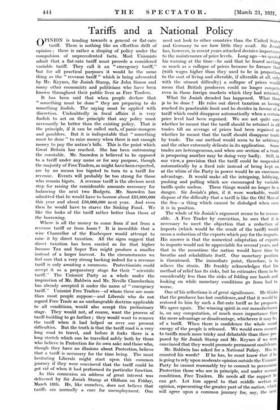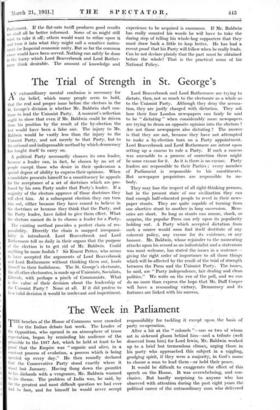Tariffs and a National Policy
OPINION is tending towards a general or flat-rate tariff. There is nothing like an effortless drift of opinion ; there is rather a shaping of policy under the compulsion of unprecedented facts. Most Unionists admit that a flat-rate tariff must precede a considered variable tariff. They call it an " emergency tariff," but for all practical purposes it would be the same thing as the " revenue tariff " which is being advocated by Mr. Keynes, Sir Josiah Stamp, Sir John Simon and many other economists and politicians who have been known throughout their public lives as Free Traders.
It has been said that when people declare that " something must be done " they are preparing to do something foolish. The saying must be applied with discretion. Undoubtedly in fiscal affairs it is very foolish to act on the principle that any policy must necessarily be better than the existing policy. That is the principle, if it can be called such, of panic-mongers and gamblers. But it is indisputable that " something must be done " to raise money when there is not enough money to pay the nation's bills. This is the point which Great Britain has reached. She has been outrunning the constable. Mr. Snowden is believed to be opposed to a tariff under any name or for any purpose, though the majority of Free Traders, as might have been expected, are by no means 'too bigoted to turn to a tariff for revenue. Events will probably be too strong for those who remain bigots. A revenue tariff is the obvious next step for raising the considerable amounts necessary for balancing the next two Budgets. Mr. Snowden has admitted that he would have to borrow about £35,000,000 this year and about £50,000,000 next year. And even then he would have to starve the Sinking Fund. We like the looks of the tariff rather better than those of the borrowing.
Where is all the money to come from if not from a revenue tariff or from loans ? It is incredible that a wise Chancellor of the Exchequer would attempt to raise it by direct taxation. All the signs suggest that direct taxation has been carried so far that higher Income Tax and Super Tax might produce a smaller instead of a larger harvest. In the circumstances we feel sure that a very strong backing indeed for a revenue tariff is only awaiting a summons. Protectionists could accept it as a preparatory stage for their " scientific tariff." The Unionist Party as a whole under the inspiration of Mr. Baldwin and Mr. Neville Chamberlain has already accepted it under the name of " emergency tariff." Unionist Free Traders—of whom there are more than most people suppose—and Liberals who do not regard Free Trade as an unchangeable doctrine applicable to all conditions, would also accept this preliminary stage. They would not, of course, want the process of tariff-building to go farther ; they would want to remove the tariff when it had helped us over our present difficulties. But the truth is that the tariff road is a very long road to travel, and before it forks there is a long stretch which can be travelled safely both by those who believe in Protection for its own sake and those who, though they have no illusions about Protection, believe that a tariff is necessary for the time being. The most hesitating Liberals might start upon this common journey if they were convinced that the tariff could be got rid of when it had performed its particular function. In this connexion an address of great interest was delivered by Sir Josiah Stamp at Oldham on Friday, March 18th. He, like ourselves, does not believe that tariffs are normally a cure for unemployment. One need not look to other countries than the United States and Germany to see how little they avail. Sir Josiah has, however, in recent years attached decisive importance to the maintenance of price levels. Long ago—we quoted his warning at the time—he said that he feared nothing so much as a collapse of prices because he foresaw that (with wages higher than they used to be in proportion , to the cost of living and alterable, if alterable at all, only with the utmost difficulty) a collapse of prices would mean that British producers could no longer compete even in those foreign markets which they had retained.
What Sir Josiah dreaded has happened. What then is to be done ? He rules out direct taxation as having reached its practicable limit and he decides in favour of a tariff which could disappear automatically when a certain price level had been regained. We are not quite sure whether he meant that the tariff should be retained in all trades till an average of prices had been regained or whether he meant that the tariff should disappear trade by trade. The one method would seem to be arbitrary and the other extremely delicate in its application. Some trades are heterogeneous, and when one section of a trade is prospering another may be doing very badly. Still, in our view, a provision that the tariff could be suspended automatically by a fixed rule instead of being kept on at the whim of the Party in power would be an enormous advantage. It would make all the intriguing, lobbying, pushing and pulling which are encouraged by variable tariffs quite useless. These things would no longer be a danger. Sir Josiah's plan, if it were workable, would dispose of the difficulty that a tariff is like the Old Man of the Sea—a thing which cannot be dislodged when once it is in position.
The whole of Sir Josiah's argument seems to be reason- able. A Free Trader by conviction, he sees that it is necessary to meet the objection that a reduction of imports (which would be the result of the tariff) would mean a reduction of the exports which pay for the imports. His answer is that the numerical adaptation of exports to imports would not be appreciable for several years, and that in the meantime the nation would have time to breathe and rehabilitate itself. Our monetary position is threatened. The immediate point, therefore, is to relieve the strain. He frankly acknowledges that his method of relief has its risks, but he estimates them to be considerably less than the risks of folding our hands and looking on while monetary conditions go from bad to worse.
One of his reflections is of great significance. He thinks that the producer has lost confidence, and that it would be restored to him by such a flat-rate tariff as he proposes. We agree again. The winning spirit in our manufacturers is, on any computation, of much more importance than the mere advantage or disadvantage, whichever it may be of a tariff. When there is confidence the whole moral energy of the people is released. We would even consent to tariffs much more tricky and debatable than those pro- posed by Sir Josiah Stamp and Mr. Keynes if we were convinced that they would promote permanent confidence. Mr. Baldwin has asked for a National Policy. Has he counted his words? If he has, he must know that if he is going to rely upon moderate opinion outside the Unionist Party he cannot reasonably try to commit to permanent Protection those who are in principle, and under normal conditions, Free Traders. He needs -all the support he can get. Let him appeal to that middle section of opinion, representing the greater part of the nation, which will agree upon a common journey for, say, the nest Parliament. If the flat-rate tariff produces good results we shall all be better informed. Some of us might still want to take it off; others would want to refine upon it and turn it into what they might call a sensitive instru- ment for Imperial economicunity. But so far the common cause would have been served. Nothing can safely be done in the hurry which Lord Beaverbrook and Lord Rother- mere think desirable. The amount of knowledge and experience to be acquired is enormous. If Mr. Baldwin has really counted his words' he will have to take the daring step of telling his whole-hog supporters that they must draw back a little to leap better. He has had a recent proof that his Party will follow when he really leads. Can he not declare plainly that the part must be obtained before the whole? That is the practical sense of his National Policy.



















































 Previous page
Previous page